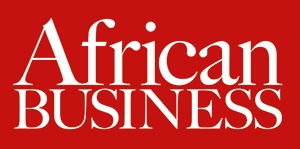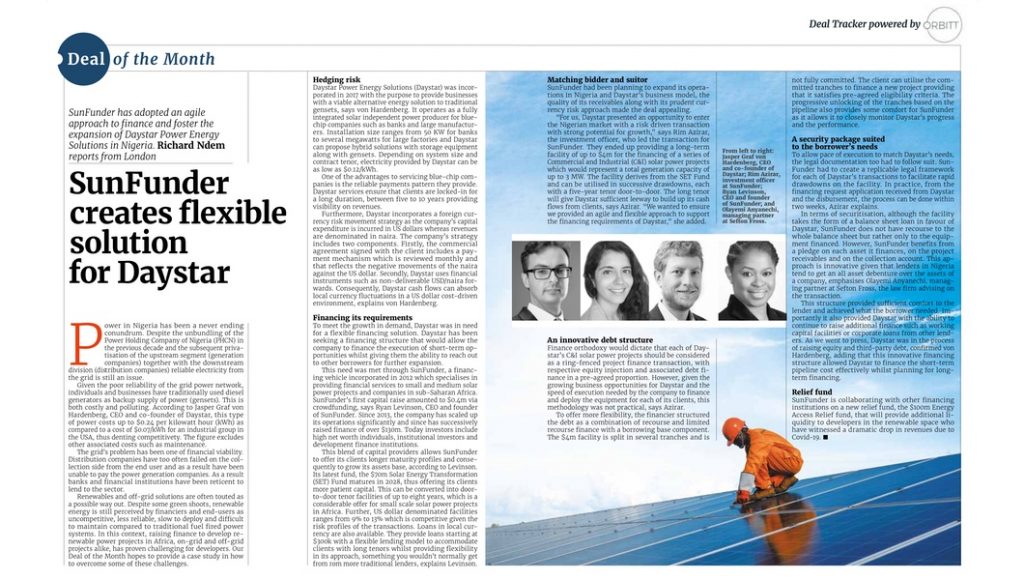 In association with African Business Magazine, market leaders in providing country supplements, industry reports and market intelligence on Africa.
In association with African Business Magazine, market leaders in providing country supplements, industry reports and market intelligence on Africa.
Find out more +
SunFunder has adopted an agile approach to finance and foster the expansion of Daystar Power Energy Solutions in Nigeria. Richard Ndem reports from London.
Power in Nigeria has been a never-ending conundrum. Despite the unbundling of the Power Holding Company of Nigeria (PHCN) in the previous decade and the subsequent privatisation of the upstream segment (generation companies) together with the downstream division (distribution companies) reliable electricity from the grid is still an issue.
Given the poor reliability of the grid power network, individuals and businesses have traditionally used diesel generators as a backup supply of power (gensets). This is both costly and polluting. According to Jasper Graf von Hardenberg, CEO and co-founder of Daystar, this type of power costs up to $0.24 per kilowatt-hour (kWh) as compared to a cost of $0.07/kWh for an industrial group in the USA, thus denting competitivety. The figure excludes other associated costs such as maintenance.
The grid’s problem has been one of financial viability. Distribution companies have too often failed on the collection side from the end-user and as a result have been unable to pay the power generation companies. As a result, banks and financial institutions have been reticent to lend to the sector.
Renewables and off-grid solutions are often touted as a possible way out. Despite some green shoots, renewable energy is still perceived by financiers and end-users as uncompetitive, less reliable, slow to deploy and difficult to maintain compared to traditional fuel-fired power systems. In this context, raising finance to develop renewable power projects in Africa, on-grid and off-grid projects alike, has proven challenging for developers. Our Deal of the Month hopes to provide a case study in how to overcome some of these challenges.
Hedging risk
Daystar Power Energy Solutions (Daystar) was incorporated in 2017 with the purpose to provide businesses with a viable alternative energy solution to traditional gensets, says von Hardenberg. It operates as a fully integrated solar independent power producer for blue-chip companies such as banks and large manufacturers. Installation size ranges from 50 KW for banks to several megawatts for large factories and Daystar can propose hybrid solutions with storage equipment along with gensets. Depending on system size and contract tenor, electricity provided by Daystar can be as low as $0.12/kWh.
One of the advantages of servicing blue-chip companies is the reliable payments pattern they provide. Daystar services ensure that clients are locked-in for a long duration, between five to 10 years providing visibility on revenues.

Furthermore, Daystar incorporates a foreign currency risk movement strategy as the company’s capital expenditure is incurred in US dollars whereas revenues are denominated in naira. The company’s strategy includes two components. Firstly, the commercial agreement signed with the client includes a payment mechanism which is reviewed monthly and that reflects the negative movements of the naira against the US dollar. Secondly, Daystar uses financial instruments such as non-deliverable USD/naira forwards. Consequently, Daystar cash flows can absorb local currency fluctuations in a US dollar cost-driven environment, explains von Hardenberg.
Financing its requirements
To meet the growth in demand, Daystar was in need of a flexible financing solution. Daystar has been seeking a financing structure that would allow the company to finance the execution of short-term opportunities whilst giving them the ability to reach out to other borrowers for further expansion.
This need was met through SunFunder, a financing vehicle incorporated in 2012 which specialises in providing financial services to small and medium solar power projects and companies in sub-Saharan Africa. SunFunder’s first capital raise amounted to $0.4m via crowdfunding, says Ryan Levinson, CEO and founder of SunFunder. Since 2013, the company has scaled up its operations significantly and since has successively raised finance of over $130m. Today investors include high net worth individuals, institutional investors and development finance institutions.
This blend of capital providers allows SunFunder to offer its clients longer maturity profiles and consequently to grow its assets base, according to Levinson. Its latest fund, the $70m Solar Energy Transformation (SET) Fund matures in 2028, thus offering its clients more patient capital. This can be converted into door-to-door tenor facilities of up to eight years, which is a considerable offer for small scale solar power projects in Africa. Further, US dollar-denominated facilities range from 9% to 13% which is competitive given the risk profiles of the transactions. Loans in local currency are also available. They provide loans starting at $300k with a flexible lending model to accommodate clients with long tenors whilst providing flexibility in its approach, something you wouldn’t normally get from the more traditional lenders, explains Levinson.
Matching bidder and suitor
SunFunder had been planning to expand its operations in Nigeria and Daystar’s business model, the quality of its receivables along with its prudent currency risk approach made the deal appealing. “For us, Daystar presented an opportunity to enter the Nigerian market with a risk driven transaction with strong potential for growth,” says Rim Azirar, the investment officer, who led the transaction for SunFunder. They ended up providing a long-term facility of up to $4m for the financing of a series of Commercial and Industrial (C&I) solar power projects which would represent a total generation capacity of up to 3 MW. The facility derives from the SET Fund and can be utilised in successive drawdowns, each with a five-year tenor door-to-door. The long tenor will give Daystar sufficient leeway to build up its cash flows from clients, says Azirar. “We wanted to ensure we provided an agile and flexible approach to support the financing requirements of Daystar,” she added.
An innovative debt structure
Finance orthodoxy would dictate that each of Daystar’s C&I solar power projects should be considered as a ring-fenced project finance transaction, with respective equity injection and associated debt finance in a pre-agreed proportion. However, given the growing business opportunities for Daystar and the speed of execution needed by the company to finance and deploy the equipment for each of its clients, this methodology was not practical, says Azirar. To offer more flexibility, the financier structured the debt as a combination of recourse and limited recourse finance with a borrowing base component. The $4m facility is split into several tranches and is not fully committed. The client can utilise the committed tranches to finance a new project providing that it satisfies pre-agreed eligibility criteria. The progressive unlocking of the tranches based on the pipeline also provides some comfort for SunFunder as it allows it to closely monitor Daystar’s progress and the performance.
A security package suited to the borrower’s needs
To allow the pace of execution to match Daystar’s needs, the legal documentation too had to follow suit. SunFunder had to create a replicable legal framework for each of Daystar’s transactions to facilitate rapid drawdowns on the facility. In practice, from the financing request application received from Daystar and the disbursement, the process can be done within two weeks, Azirar explains.
In terms of securitisation, although the facility takes the form of a balance sheet loan in favour of Daystar, SunFunder does not have recourse to the whole balance sheet but rather only to the equipment financed. However, SunFunder benefits from a pledge on each asset it finances, on the project receivables and on the collection account. This approach is innovative given that lenders in Nigeria tend to get an all asset debenture over the assets of a company, emphasises Olayemi Anyanechi, managing partner at Sefton Fross, the law firm advising on the transaction.
This structure provided sufficient comfort to the lender and achieved what the borrower needed. Importantly it also provided Daystar with the ability to continue to raise additional finance such as working capital facilities or corporate loans from other lenders. As we went to press, Daystar was in the process of raising equity and third-party debt, confirmed von Hardenberg, adding that this innovative financing structure allowed Daystar to finance the short-term pipeline cost-effectively whilst planning for long-term financing.
Relief fund
SunFunder is collaborating with other financing institutions on a new relief fund, the $100m Energy Access Relief fund, that will provide additional liquidity to developers in the renewable space who have witnessed a dramatic drop in revenues due to Covid-19.
Read this Deal of the month, including Deal tracker and more via African Business Magazine



